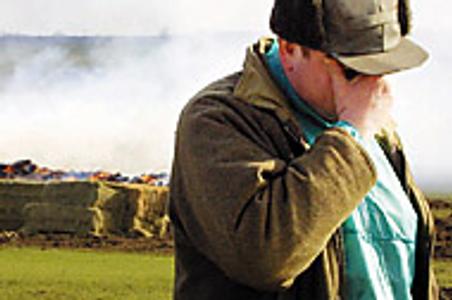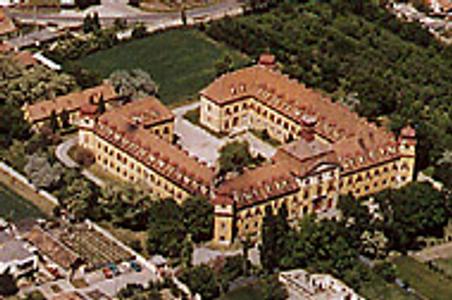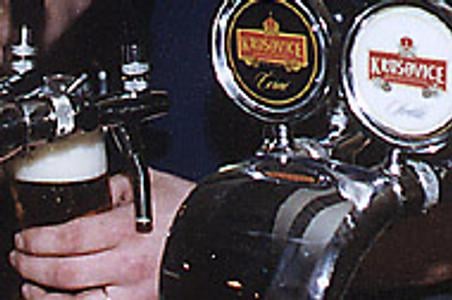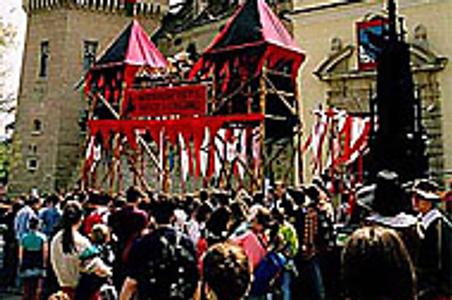Archive of articles - April 2001, page 2
If you desire to read an old article, use the search bar or select the publication date.
Rusko reveals line-up of ANO party
Pavol Rusko, the owner of the country's most popular TV station, Markíza, on April 22 introduced the new faces and name of his party, putting an end to weeks of speculation as to what form his entry into politics would take.The name of Rusko's new party, he announced at a press conference in Bratislava, will be the New Alliance of Citizens, or ANO (meaning 'yes').ANO's line-up includes former Markíza journalists, a current member of parliament, prominent athletes, an academic involved in Project Infovek (a scheme to link schools to the Internet), a spa director, and a nuclear physicist.Rusko described his party as right-centrist with free-market values. The new leaders of ANO said that Rusko, by surrounding himself with a largely apolitical group, had created a party structure which would serve "the future of Slovakia", rather than just the interests of one of the most powerful men in the country, as analysts have warned.
Business Briefs
Telecoms minister questioned over bribe allegationVaškovič says VÚB sale likely by JuneMolex forecasts more jobs as new hall openedUnion Banka calls for diplomatic help in SPP casePrime Minister makes call for "labour police"Čierny: State could run into guarantee problemsSLSP profit swells on previous year
Author Pišťanek: A "certified drunk" and "really crazy"
An admirer of Ronald Reagan and Margaret Thatcher, a fierce anti-communist and (in his own words) a "certified drunk", Slovak author Peter Pišťanek is either loved or hated. Criticised as vulgar and uncultured by detractors, he is praised for his originality and striking humour by fans."Pišťanek gave Slovak literature a new style of prose," said friend and literature critic Peter Darovec. "He didn't bother with sensitive or psychological lectures, he didn't bore his readers with moralising. Instead, he clearly, roughly, cynically and humorously described the reality everyone in this post-communist country was feeling, but was unable to express."
COLUMN: Learning key to job success
Training and development is an issue that is frequently addressed when discussing human resource management within a firm. Organisations not only understand the importance of developing their employees, but also put great emphasis on it.While the concept of developing and enhancing knowledge is well embedded in Slovak corporate thinking, it is not so sure that employees are equally keen on enhancing their competence. Nor do employees always consider their development their own responsibility, or make the effort to continually develop themselves.Evidence that one must constantly and systematically upgrade what one knows and what skills one possesses is readily found in the recruitment advertisements of companies seeking to build good workforces. These ads often offer possibilities for further education to successful candidates.
Languages key for tech jobs
Adela Bunčáková, Schneider Electric Slovakia's HR Manager, explained to The Slovak Spectator just how difficult it can be to find the right person for the job - especially when they need a relatively good set of language skills.The Slovak Spectator (TSS): What sort of employees is your company looking for? What positions are you looking to fill?
Foot-and-mouth rules loosed
'It's under control' - that's the message from the State Veterinary Authority (ŠVS), which has relaxed measures taken to combat the spread of a dreaded and highly infectious livestock disease into Slovakia. In Britain, foot-and-mouth has forced the slaughter of a huge swathe of livestock, while the disease has spread to three other European countries (Ireland, Holland and France). On March 14, the ŠVS took a series of preventative measures against the disease, which infects cloven-footed livestock. A ban was imposed on imports, exports, and transfers of livestock and hogs, sperm, embryos, meat, and meat products to and from all countries hit by foot-and-mouth disease. Movement between farms by workers or managers was also prohibited, and zoos were closed.
Insurer prefers sales rookies
For people working in an international insurance firm, energy and dynamism, not age, are key attributes, says Marcela Slimáková, HR Coordinator for Nationale Nederlanden Slovak Republic. Explaining to The Slovak Spectator exactly what qualities a successful job candidate needs, she cited loyalty, and noted that is was a two way street.The Slovak Spectator (TSS): What qualities and qualifications do you expect from your potential employees?
Keeping Slovak industry accident-free
Last month we saw that waste management is an area where the European Union has a whole set of requirements for member states, and also for a candidate country like Slovakia. This month we concentrate on the EU's requirements for the safety of hazardous plants.These date back to 1982, when the first set of safety requirements were introduced following a major accident at Seveso in Italy, where large quantities of dioxins were released into the atmosphere. The legislation was updated in 1996 under the 'Seveso II' directive on the control of major accident hazards involving dangerous substances, in the light of other disasters such as those at Bhopal, India and Mexico City.While, mercifully, Slovakia has not seen any major industrial accidents on such a tragic scale, there have been a number of less serious accidents in recent years, including an explosion at the VSŽ steel mill that killed 11 people, a fatal release of chlorine at industrial agriculture firm Duslo Šala, and a release of ammonia from the Bratislava ice hockey stadium.
Long work hours still shock
With her firm currently looking for people to work in international centres based in Bratislava, IBM Slovakia's HR Manager Eva Megová talked to The Slovak Spectator about IT employment and the surprising reaction of some younger job applicants to western working practices.In Megová's view, adjusting to the faster work tempo and longer hours common to western firms is a challenge for all Slovak workers, regardless of their age and prior work history.
Busted: How to survive the police
When I was a wee lad, my father's faith in the probity of the police was unshakeable, and in our family formed another stout wall parents erect between childhood innocence and adult wickedness.Years later, after his sons' assorted 'run-ins' with the law, dad's faith is tattered, but still stubbornly intact. My own trust, which was never absolute to begin with, has been razed after almost a decade in Slovakia, where the best rule to go by is that you can expect the cops to be at least as venal as the man on the street.Norman Mailer, in his novel Tough Guys Don't Dance, wrote that people are attracted to the police corps 'to shield themselves from their own criminality', by which I think he meant that a cop's badge gives people a certain freedom to indulge in behaviour that comes naturally to them, and which wouldn't otherwise be 'legal' (the evidence baggies of cocaine that must be 'tested', the self-righteous beatings of non-white 'suspects' etc.)
Restitution chaos: Finger-pointing betrays hypocrisy
Amid the whippings, waterings and brutish male revelry of the Slovak Easter holiday, an important date quietly slipped by. As of Easter Sunday, a 10-year old law that prevented some owners of property confiscated by the Communists from disposing of their holdings no longer applies.As of April 16, people who after 1991 reclaimed property that houses hospital, educational, cultural or 'social' services (i.e. for mentally or physically handicapped patients, old people etc.) are free to raise rents or to evict their tenants and sell the real estate. During the previous decade, these owners had been prevented from doing either, under a law designed to protect vulnerable or impoverished tenants from losing their accommodation.The new state of affairs has been covered by the Slovak electronic and print media as a case in which capitalist owners - those who got their property back under the 1991 'Restitution Law' - may be about to turn handicapped people and pensioners out of their beds without so much as a by-your-leave.
State neglect angers restitution claimants
The town of Veľký Biel, with its baroque manor house built in 1772, lies 20 kilometres east of Bratislava in one of the nation's highest-priced real estate areas. Since 1952, Veľký Biel's manor house has housed a clinic for mentally handicapped women, 154 of whom live there today. But these women may soon find themselves on the street."They've got used to their beds, their rooms and the manor house," said Peter Bičan, the head of the clinic. "Any change in their environment could cause serious complications to their health. If they are moved out, they will have to be accompanied by 154 soldiers, because I myself can't safeguard their security."The women's future depends on whether an agreement can be forged between the state and nine property claimants, to whom the manor house was returned as part of Slovakia's 'restitution process' 10 years ago.
Around Slovakia
Good Friday turns bad for robbery victimPoliticians celebrate Slovak Easter traditionsHooligans attack busTragedy in the Tatras
Community Corner
Danube MarathonItalian Institute Film FestivalSpanish Embassy concertAustrian Culture Centre exhibition in PrešovAustrian Culture Centre film presentation and exhibitionsGoethe Institute exhibitionsFrench Institute lectureBratislava Town GallerySpanish exhibition at DanubianaBahá'í Community
SLSP funds diverted from bond payout
Minister for Labour, Family and Social Affairs Peter Magvaši praised an April 11 cabinet decision to allot privatisation proceeds from the sale of a state bank to two struggling state companies. The FNM state privatisation agency immediately declared that the move put plans for repaying FNM bonds under threat.Having originally said that money from the 18 billion crown sale of Slovenská sporiteľňa bank in December 2000 would be used to finance state debt, specifically the 26.3 billion crowns needed to repay FNM bonds issued in 1996, the government reallocated 2.1 billion crowns from the sale to social insurance company Sociálna poisťovná (SP) and rail firm ŽSR.SP will receive 1.5 billion crowns in the next few weeks, while ŽSR will receive the remaining money. The rail company will use the funds to pay overdue social insurance premiums to SP.
Culture Shock: How to win over Slovak pub waiters
A colleague and I were sitting in the beer garden of Bratislava's spacious Umelka pub last summer, ordering shots of borovička. Our waiter brought the first order, then another, then another... Eventually, he grew impatient."What about me?" he asked.My colleague and I looked at each other, shrugged and ordered three more shots. "Ešte tri borovičky, si prosím."He brought the shots, put down his tray, clinked glasses with us and downed the bitter alcohol. "Dobre," he said. "From now on, drop the [formal] vykať [form of address] and use the [familiar] tykať."
Top Pick: Ghosts fend off alien intruders at Bojnice castle
When night falls on April 26, the ghosts of Bojnice castle will emerge from their death slumbers to mingle with the living. At 21:00 sharp, they'll gather around the castle moat to welcome alien agent C3M from Sirius 5. But C3M has a dastardly plan, and when the ghosts discover his intent to beam the castle up to his home planet, a bloody battle ensues."I am really concerned about the old people living nearby the castle," says Jozef Mikuláš Pálffy, director, screenwriter and co-author of the theatrical show. "When they see the flying saucer landing in the moat, I hope they won't think it's a real UFO invasion."The ghost and alien battle show will be the main attraction at this year's International Festival of Ghosts and Spirits (Medzinárodný festival duchov a strašidiel) at Bojnice castle in western Slovakia. Lasting 90 minutes, the show will be performed by 111 actors and dancers several times a day from April 27 to May 1 and May 4 to 8. The story of ghosts and aliens, which includes audience participation and snakes throughout the whole castle, changes from serious and horrifying to satiric and sentimental.
Hawks, falcons guarding runways
Bratislava's Milan Rastislav Štefánik airport may have a hard time attracting passengers and major airlines, but it has no problem drawing birds.Scores of pigeons, crows and gulls converge on the airport every day. The gathering flocks create a problem, airport officials say, as 'bird strikes' - when an aircraft hits a bird in flight - pose a serious threat to passenger safety and the aircraft themselves.Last year, bird strikes at the Bratislava airport (which averages 22 landings and take-offs a day) damaged two planes, one of which suffered two million Slovak crowns ($42,000) in damage after a mid-air collision with a bird destroyed its engine. The problem is not limited to Slovakia: in 1960, a jet in the US struck a flock of starlings and crashed into Boston Harbour, killing 62 people, CNN reported last November. The US news channel also reported that the Israeli Air Force has in its history lost more planes to bird strikes than to enemy fire.
- The law changed. Our family papers were ready. Now my kids are Slovak citizens
- Maria Theresa on the banks of Bratislava
- The Kremlin’s security agency has a Russian contractor in Slovakia - no one has noticed
- Slovak female triathlete shatters barriers with historic win at Himalayan event
- Slovakia loses another EV model to Spain as Stellantis chooses Zaragoza over Trnava
- From eight to thousands of runners. How Košice marathon rose to prominence Photo
- Iconic Slovak barn still draws crowds. Without donors, it might have been lost Photo
- No more photos or bank statements? Slovakia moves to ease residence process
- The law changed. Our family papers were ready. Now my kids are Slovak citizens
- Maria Theresa on the banks of Bratislava
- Slovak female triathlete shatters barriers with historic win at Himalayan event
- The Kremlin’s security agency has a Russian contractor in Slovakia - no one has noticed
- Slovakia loses another EV model to Spain as Stellantis chooses Zaragoza over Trnava
- No more photos or bank statements? Slovakia moves to ease residence process
- From eight to thousands of runners. How Košice marathon rose to prominence Photo
- Iconic Slovak barn still draws crowds. Without donors, it might have been lost Photo
- The law changed. Our family papers were ready. Now my kids are Slovak citizens
- Maria Theresa on the banks of Bratislava
- No more photos or bank statements? Slovakia moves to ease residence process
- Weekend: Celebration of fun comes to Malacky Photo
- 3 free things to do in Bratislava in the next seven days
- Top 10 events in Bratislava for foreigners
- The Kremlin’s security agency has a Russian contractor in Slovakia - no one has noticed
- Digital Jarvis is real now. He is coming for your to-do list
- The law changed. Our family papers were ready. Now my kids are Slovak citizens
- Maria Theresa on the banks of Bratislava
- No more photos or bank statements? Slovakia moves to ease residence process
- A mayor resigns over €2.7 million fraud scandal at town hall
- The Kremlin’s security agency has a Russian contractor in Slovakia - no one has noticed
- Fico praises China and Vietnam as models, says liberal democracy has failed
- News digest: Violent gang in Bratislava is under arrest
- He designed Gatwick. But this is his masterpiece
- The law changed. Our family papers were ready. Now my kids are Slovak citizens
- News digest: Prosecutor seeks jail for NBS Governor Kažimír as his political support wanes
- Slovakia loses another EV model to Spain as Stellantis chooses Zaragoza over Trnava
- Slovak female triathlete shatters barriers with historic win at Himalayan event
- Weekend: Celebration of fun comes to Malacky Photo
- News digest: Fico’s bloc wants to save money by restricting electoral access
- Slovakia plans to restrict access to new medicines amid funding shortfall
- No more photos or bank statements? Slovakia moves to ease residence process More articles ›









